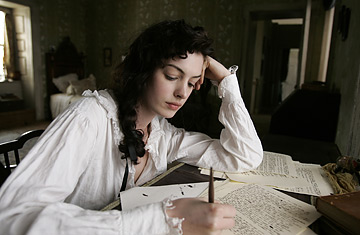
Anne Hathaway in Becoming Jane.
Now that most of her major novels have at least once been made into movies, you'd think they'd give Jane Austen some time off for good behavior. Instead, we have Becoming Jane, which plays like an Austen adaptation, but is in fact a biopic with an asterisk. That is to say, there is some scant evidence that the young, would-be novelist (Anne Hathaway) had a flirtation with an impecunious Irish lawyer named Tom LeFroy (James McAvoy) that came to a lot less than this movie rather melodramatically makes it out to be. Call it, perhaps, a fantasy based on a stray nugget of historical gossip.
In other words, they may have danced together and possibly canoodled chastely in the woods, but there is no evidence that they attempted to run away together. Or that his rich uncle or her rich neighbors cruelly tried to sunder their relationship. Or that. But it may not matter. Austen has become, in recent years, a kind of movie franchise, in some ways not unlike Harry Potter — except, of course, for a much more limited and self-consciously literary audience. With the exception of the rambunctious and highly cinematic Emma Thompson-Ang Lee Sense and Sensibility of a dozen years ago, these adaptations always strike me as rather wan and patronizing — and this movie is no exception to that rule.
By that I mean that there's something slightly comic in the formalities of 18th century language on screen that encourages us to look down at the characters speaking it. Poor dears! If only they could more frankly speak their desires, if only they were not so hedged by the ruling decorum of their historical moment. They encourage in us a kind of smugness, a sense that if they were only more psychologically more hip and open (as we are), their lives would be more fully human, a little less cartoonish. These films therefore miss much of Austen's satirical edge — and much of her gently spoken toughness of mind and spirit.
In Becoming Jane, which is directed by Julian Jarrold, one gets the sense of the actors wearing costumes without actually living in them, of them walking about in settings they don't seem to fully inhabit. They feel plunked down in alien surroundings, and a lot of the time I felt the unseen spirit of the art director, proud of having found the perfect old churchyard or country house. Put it simply: The movie approximates antique reality, but it never sweeps us heedlessly into that reality.
That's particularly true of Anne Hathaway, playing Jane. She is extraordinarily attractive, which the historical Jane was not, and does lot of scribbling. But Hathaway never makes us think the woman could write anything more complex than a diet book. The real novelist must have been, even at the tender age she is supposed to be in this film, a much more ferocious creature, determined to make her way as a writer, certain that love — and it is said that she had other, perhaps more meaningful flirtations than this one — must prove a distraction from writing.
I would rather have seen a movie about a woman gripped by a frustrated passion to create than a frustrated passion for a really cute guy. I'll stipulate that in Austen's time spinsterhood was a fate to be strenuously avoided. And being a woman writer was by no means an easy path either. Yet, she embraced it, and the immortal results more than justify a hard choice this film never really explores.
